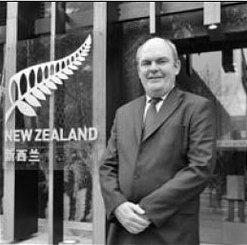New Zealand minister improves links with China
While visiting China to promote cooperation between New Zealand's and China's information and communication technologies (ICT) companies, Steven Joyce also tackled education issues.
This is in keeping with his dual roles of New Zealand minister of Communications and Information Technology, and Tertiary Education minister.
The first stop on Joyce's seven-day trip, starting Oct 16, was in Beijing, where he attended the China Annual Conference for International Education and spoke about the role of higher education in meeting global environmental challenges.
He also visited Tsinghua University to discuss the tripartite relationship between the University of Auckland, Tsinghua University, and Qinghai University, which began in 2005.
The universities are involved in a "three-brothers" program that features high-level staff exchanges, PhD scholar exchanges, and research collaboration on ICT projects.
"The ICT sector, a sector of clean and creative technologies, is crucial to improving the productivity and wealth of both China and New Zealand," he says.
|
|
| Steven Joyce at the New Zealand Pavilion during his visit to Shanghai Expo. |
"Education and ICT are two crucially important disciplines for the future of both of our countries and it's significant to enhance the cooperation between education and ICT industries," he adds.
Joyce says in New Zealand, some universities with strong commercial objectives are running ICT companies and development of ICT industries are a focus of the country's tertiary education strategy.
Last year, New Zealand spent NZ$11 million ($8.2 million) supporting teachers to use digital technologies.
A program to deliver ultra-fast broadband fiber to three-quarters of homes and business premises is taking place and schools are at the center of the program, he says.
One of the companies in the minister's delegation, Pingar, is an enterprise that has developed a set of advanced semantic search technologies to make Internet searches smarter.
The company is seeking to develop long-term research relationships with Chinese universities and research institutes to enable Chinese language enterprises and Internet users benefit from improved search capabilities.
For instance, the University of Waikato is collaborating with the Chinese Academy of Social Sciences to promote education in China's rural areas by employing information and communication technologies like high-speed computing networks.
"It's very important for schools in both China and New Zealand to keep up with what is happening in the wider world. And the ICT has a great potential to lift the performance of education," he says.
During the mission, Joyce also met with the Ministry of Industry and Information Technology and key telecommunications companies in Beijing to help New Zealand ICT companies build a sustained presence in China.
He also spent a day at the World Expo and addressed a Kiwi Expat Association function in Shanghai, and visited Huawei's research and development facility in Shenzhen.
 0
0 








Go to Forum >>0 Comments